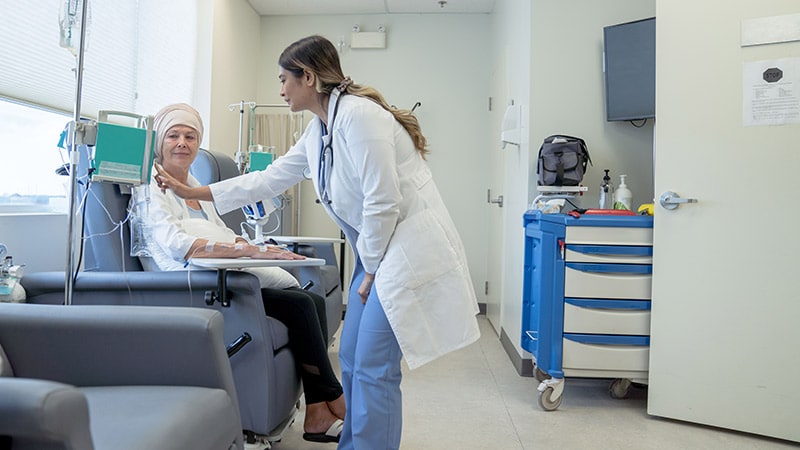Analysis of Secondary Cancers Post CAR T Therapy
แนวคิดหลัก
Secondary cancers post CAR T therapy are a concern, with T-cell malignancies being a significant issue.
บทคัดย่อ
TOPLINE:
4.3% of adverse event reports post CAR T therapy involved secondary cancers.
T-cell malignancies accounted for 0.15% of total reports and 3.54% of second primary malignancies.
METHODOLOGY:
FDA investigated the risk of T-cell malignancies post CAR T therapy.
Boxed warnings issued for six approved CAR T cell therapies due to second primary malignancies possibility.
TAKEAWAY:
536 adverse events (4.3%) were second primary malignancies post CAR T therapy.
Axicabtagene ciloleucel and tisagenlecleucel had the highest reports of second primary malignancies.
IN PRACTICE:
Benefits of CAR T-cell therapies outweigh risks for approved indications.
SOURCE:
Study led by Magdi Elsallab from Harvard Medical School published in Blood.
LIMITATIONS:
Analysis limitations include duplicate reports, incomplete data, and difficulty in establishing causal relationships.
DISCLOSURES:
Study funding source undisclosed, authors reported financial ties with various organizations.
Secondary Cancers Post CAR T Therapy: A Concern?
สถิติ
Secondary cancers were flagged in 4.3% of all adverse event reports among patients who received CAR T therapy.
T-cell malignancies comprised only 0.15% of the total reports and 3.54% of all second primary malignancies.
536 adverse events (4.3%) were second primary malignancies post CAR T therapy.
Axicabtagene ciloleucel and tisagenlecleucel accounted for most of the second primary malignancies reports.
19 cases of T-cell malignancies were identified, representing only 0.15% of all unique adverse events and 3.54% of all second primary malignancies.
Among the reported 536 second primary malignancies, the most frequent cancers were leukemias (62%), followed by skin neoplasms (10.1%).
คำพูด
"We will continue to monitor the data released by the FDA to learn more about CAR T-associated risks." - Magdi Elsallab
ข้อมูลเชิงลึกที่สำคัญจาก
by Deepa Varma ที่ www.medscape.com 03-20-2024
https://www.medscape.com/viewarticle/secondary-cancers-post-car-t-therapy-concern-2024a100056a
สอบถามเพิ่มเติม
How can the medical community address the risks associated with secondary cancers post CAR T therapy?
To address the risks associated with secondary cancers post CAR T therapy, the medical community can take several proactive steps. Firstly, close monitoring and surveillance of patients who have undergone CAR T therapy are essential to detect any signs of secondary malignancies early. Regular follow-up appointments and imaging studies can aid in early detection and prompt intervention. Additionally, healthcare providers should educate patients about the potential risks of secondary cancers post CAR T therapy, enabling them to report any concerning symptoms promptly. Research into the underlying mechanisms of secondary malignancies post CAR T therapy is crucial to develop strategies for risk mitigation and personalized treatment approaches.
What are the potential implications of the boxed warnings issued for CAR T cell therapies?
The issuance of boxed warnings for CAR T cell therapies carries significant implications for both healthcare providers and patients. Firstly, these warnings raise awareness about the potential risk of developing secondary primary malignancies, including CAR-positive lymphomas, post CAR T therapy. Healthcare providers must discuss these risks with patients before initiating treatment, ensuring informed decision-making. Patients receiving CAR T therapy should be closely monitored for any signs or symptoms of secondary cancers, with appropriate interventions implemented promptly. The boxed warnings serve as a reminder of the importance of ongoing surveillance and research to enhance the safety profile of CAR T cell therapies.
How can the limitations of the analysis impact the understanding of the risks associated with CAR T therapy?
The limitations of the analysis, such as duplicate report submissions, incomplete data, and challenges in establishing causal relationships, can impact the understanding of the risks associated with CAR T therapy. Duplicate reports may skew the actual frequency of adverse events, leading to potential overestimation or underestimation of risks. Incomplete data may hinder a comprehensive assessment of the true incidence of secondary cancers post CAR T therapy. Difficulties in establishing causal relationships between CAR T therapy and secondary malignancies can cloud the interpretation of adverse event reports. Moreover, underreporting or overreporting based on the severity of adverse events may distort the overall risk profile of CAR T therapy. Addressing these limitations through robust data collection, analysis, and transparency is essential to enhance the accuracy and reliability of risk assessments related to CAR T therapy.
0
